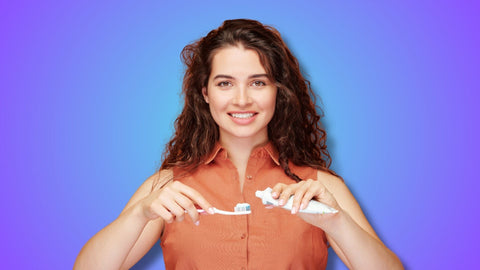Is it Ok to Leave Toothpaste on Your Teeth Overnight?
Yes, leaving toothpaste on your teeth overnight is generally considered safe as long as it’s not too abrasive and doesn’t contain fluoride.
Abrasive toothpaste can potentially wear down tooth enamel if left on the teeth for an extended period.
Additionally, fluoride-containing toothpaste left on the teeth overnight may lead to excessive fluoride ingestion, which can be harmful.
Therefore, we recommend using nano hydroxyapatite toothpaste which you can leave on overnight without any potential risks.
Alternatively, you may rinse it off 30 minutes after brushing to remove any toothpaste residue if you prefer.
Keep reading to learn everything you need to know about the potential risks and benefits of leaving toothpaste on your teeth overnight.
How does toothpaste work?

Toothpaste works by combining various ingredients to achieve optimal oral hygiene.
Traditional toothpaste typically contains abrasives, like charcoal, to physically remove plaque and stains from the tooth surface.
Additionally, fluoride in toothpaste not only helps strengthen tooth enamel but also helps prevent tooth decay by making teeth more resistant to acid attacks from bacteria. However, excessive use of fluoridated toothpaste can lead to harmful effects in the long term.
On the other hand, toothpaste tablets work by dissolving into a foamy paste when chewed that you can then use to brush your teeth with a wet toothbrush. Besides the chewing part, toothpaste tablets work just like traditional paste.
When you brush with toothpaste tablets, you’re delivering safe ingredients like nano hydroxyapatite which deposits calcium and phosphate ions into your tooth enamel. This process, known as remineralization, not only strengthens teeth but also prevents and reverses tooth decay. Nano hydroxyapatite toothpaste tablets can even whiten teeth.
For all these reasons, you can ditch the toothpaste tubes with peace of mind knowing that nano hydroxyapatite toothpaste tablets are just as effective as traditional toothpaste, just with natural ingredients and fewer unnecessary chemical preservatives.
Why should we leave toothpaste on our teeth overnight?

We should leave toothpaste on our teeth overnight as it allows the active ingredients to work more effectively on the teeth.
Leaving toothpaste on your teeth overnight can give nano hydroxyapatite more time to work, which can be beneficial in preventing tooth decay and sensitivity.
The extended contact time enables the toothpaste to better integrate with the tooth structure and provide long-lasting benefits for oral health.
However, it’s important to avoid using toothpaste with abrasive ingredients or high fluoride concentrations, as these can potentially cause enamel erosion or fluoride toxicity if left on the teeth overnight.
Overall, leaving toothpaste on your teeth overnight can be beneficial for your oral health, but it’s important to use it in conjunction with regular brushing and flossing and to choose a toothpaste that is specifically designed for your dental needs.
Benefits of Leaving Toothpaste on Teeth Overnight

Leaving toothpaste on your teeth overnight is beneficial especially if it contains nano hydroxyapatite rather than fluoride.
While both have similar efficacy, studies suggest that nano hydroxyapatite toothpaste has no side effects compared to fluoride, making it a safer option for prolonged use.
Here are several benefits of leaving nano hydroxyapatite toothpaste on your teeth overnight:
Benefit 1: Strengthening of Tooth Enamel
Leaving toothpaste on your teeth overnight can potentially facilitate the prolonged exposure of nano hydroxyapatite to the enamel. nHA helps to remineralize and strengthen the enamel, making it more resistant to decay, acid erosion, and acid attacks from plaque bacteria and sugars.
This continuous exposure to nHA overnight may contribute to enhanced enamel protection and overall dental health, making teeth more resistant to the harmful effects of acid attacks.
Benefit 2: Continued Plaque Control
Toothpaste contains cleaning agents and antibacterial agents that work to remove plaque and inhibit bacterial growth.
Specifically, by leaving toothpaste on your teeth overnight, you not only extend the duration of these agents’ action but also enhance their effectiveness in removing plaque and food particles from the tooth surface.
This practice can provide continuous plaque control throughout the night, helping to reduce the accumulation of plaque and food particles, and lower the risk of dental issues such as cavities and gum disease.
Benefit 3: Fresher Morning Breath
Leaving toothpaste on your teeth overnight can contribute to fresher morning breath. Many toothpaste formulations contain flavorings and antibacterial agents that combat oral bacteria responsible for bad breath.
By leaving toothpaste on your teeth overnight, these ingredients have more time to work, resulting in a fresher feeling when you wake up in the morning.
Therefore, choosing a toothpaste with nano hydroxyapatite and leaving it on overnight can further enhance its benefits for maintaining optimal oral health.
Risks of Leaving Toothpaste on Teeth Overnight

Risk 1: Potential Tooth Sensitivity
Leaving toothpaste on your teeth overnight could increase the risk of tooth sensitivity, particularly if the toothpaste contains ingredients such as abrasives or desensitizing agents.
Prolonged exposure to these substances may irritate the teeth and gums, leading to discomfort or heightened sensitivity to hot, cold, or acidic foods and beverages.
Risk 2: Irritation of Soft Tissues
Some toothpaste formulations may contain ingredients, like sodium lauryl sulfate, that can irritate the delicate tissues of the mouth, including the gums, cheeks, and tongue.
Leaving toothpaste on your teeth overnight may exacerbate this irritation, potentially leading to soreness, inflammation, or even oral lesions in some individuals.
Risk 3: Disruption of Oral Microbiome
The prolonged presence of toothpaste on the teeth and gums overnight may disrupt the natural balance of bacteria in the mouth, known as the oral microbiome.
This disruption could potentially promote the overgrowth of harmful bacteria or fungi, increasing the risk of oral infections, bad breath, or other oral health issues over time.
While toothpaste is formulated to be safe for oral use when used as directed, leaving it on your teeth overnight may introduce unnecessary risks specifically if it contains fluoride.
It's essential to follow proper oral hygiene practices, including brushing, expandable flossing, tongue scraping and swishing mouthwash before bed, to maintain optimal oral health and minimize potent
Is it safe to leave toothpaste on our teeth overnight?
Yes! It is safe to leave toothpaste on your teeth overnight as long as it doesn't contain abrasive ingredients and fluoride.
Instead, using fluoride-free toothpaste that contains nano hydroxyapatite is a safer option for overnight use.
In fact, nano hydroxyapatite toothpaste can promote remineralization and strengthen tooth enamel without the risk of excessive fluoride ingestion.
Additionally, nHA toothpaste has been found to have fewer or no side effects compared to fluoride, making it a preferable choice for leaving overnight.
However, it's important to note that if you choose to leave toothpaste on your teeth overnight, you should avoid eating or drinking immediately after brushing to allow the toothpaste to work effectively.
Overall, opting for fluoride-free toothpaste containing nano hydroxyapatite can provide safe and effective overnight protection for your teeth.
How to Brush Your Teeth Properly

To brush your teeth properly, here's the simple process that you need to know:
-
Select the Right Toothpaste Tablets: Choose toothpaste tablets containing nano hydroxyapatite, a natural mineral that strengthens enamel and remineralizes teeth. These tablets provide gentle yet effective cleaning without potential risks and harsh abrasives.
-
Prepare the Tablet: Place a single toothpaste tablet in your mouth and chew it until it forms a creamy paste. This process activates the nHA and allows it to adhere to the tooth surfaces for optimal remineralization.
-
Wet Your Toothbrush: Wet your toothbrush with water to help distribute the toothpaste evenly across your teeth.
-
Brush in Gentle Circular Motions: Using gentle pressure, brush your teeth in small circular motions. Focus on covering all surfaces of your teeth, including the fronts, backs, and chewing surfaces, to ensure comprehensive cleaning.
-
Don't Forget Your Tongue and Roof of Your Mouth: After brushing your teeth, use the remaining paste to gently brush your tongue and the roof of your mouth to remove bacteria and freshen your breath.
-
Leave the toothpaste: Leave the toothpaste in your mouth, no need to rinse immediately to allow the nano hydroxyapatite to work on your teeth and mouth.
-
Brush Twice Daily: Brush your teeth with toothpaste tablets containing nano hydroxyapatite at least twice a day, ideally in the morning and before bed, to maintain optimal oral health and promote enamel remineralization.
By following these steps and incorporating nano hydroxyapatite toothpaste tablets into your oral hygiene routine, you can effectively clean and strengthen your teeth for a healthier smile.
Should you rinse after brushing your teeth?
No, you should avoid rinsing your mouth immediately after brushing your teeth.
Rinsing with water or mouthwash immediately after brushing can wash away the active ingredients from the toothpaste, reducing its effectiveness in protecting your teeth from decay.
Instead, it's best to spit out the excess toothpaste after brushing without rinsing, allowing the nano hydroxyapatite to continue working on your teeth.
However, if you prefer to rinse, wait at least 30 minutes after brushing to allow the ingredients to work and fully absorb into your teeth before rinsing with water or mouthwash.
This way, you can maximize the benefits of your toothpaste and maintain your optimal oral health.
How long should you let toothpaste sit on your teeth?
You should wait at least 20-30 minutes before rinsing your mouth after brushing.
This allows fluoride or nano-hydroxyapatite toothpaste more time to strengthen enamel and prevent tooth decay. Rinsing right away can wash away these active ingredients, making them less effective.
Letting the toothpaste sit for a bit helps clean teeth thoroughly and reduce cavities. Spitting out excess toothpaste without rinsing keeps its benefits on your teeth longer.
However, leaving it on too long might irritate some people, so it’s important to find a balance.
Waiting 20-30 minutes is a good way to get the most protection from your toothpaste.
Other Tips for Great Oral Hygiene

Brush with Nano Hydroxyapatite Toothpaste
Incorporate toothpaste containing nano hydroxyapatite into your oral care routine.
Nano hydroxyapatite is a natural mineral that can help strengthen enamel, remineralize teeth, and promote overall dental health.
By brushing with nano hydroxyapatite toothpaste, you can provide your teeth with extra protection and support against decay and erosion.
Use Expanding Floss Daily
Daily flossing with expandable dental floss is an excellent way to remove food particles and plaque from between your teeth and along the gum line.
This practice supports overall oral health and reduces the risk of enamel demineralization by preventing the buildup of harmful bacteria and acids in these hard-to-reach areas.
We recommend using expandable floss at least three times per week but preferably daily for best results.
Grab Your Tongue Scrape

Tongue scraping helps remove bacteria and debris from the tongue's surface, promoting fresher breath and reducing the presence of harmful microorganisms in the mouth.
Maintaining a cleaner oral environment can indirectly support remineralization by minimizing the impact of harmful bacteria.
Gargle with Alcohol-Free Mouthwash
Alcohol-free mouthwash can be a gentle choice for maintaining oral hygiene. It helps freshen your breath, reduce the growth of harmful bacteria, and provide supplement your usual routine of brushing and flossing.
Using alkaline mouthwash can help maintain a favorable environment for remineralization, especially when needed for additional oral care.
Frequently Asked Questions
How long can you leave toothpaste on your teeth?
You can leave your toothpaste in your teeth for 20-30 minutes before rinsing, allowing the nano hydroxyapatite to adhere to your tooth surface and promote remineralization. This extended contact time can enhance the remineralization process of your enamel, making it stronger and more resistant to decay.
Can you leave toothpaste on your teeth to whiten them?
Yes, you can leave nano hydroxyapatite toothpaste in your teeth to whiten them. The toothpaste contains mild abrasives that can help remove surface stains on your teeth, and the nano hydroxyapatite particles can integrate into the tooth enamel, promoting remineralization and whitening. Leaving the toothpaste on your teeth for an extended period, such as overnight, can enhance the whitening effects by allowing the abrasives and whitening agents to work more effectively on the teeth. However, it’s essential to note that fluoridated toothpaste may not be recommended to leave on your teeth overnight as it may cause several unwanted side effects.
What happens if I sleep with toothpaste on my teeth?
You can leave fluoride free toothpaste on your teeth without significant concerns, as it’s generally safe and beneficial for enamel remineralization. However, leaving fluoride toothpaste on your teeth overnight may pose certain risks, such as potential ingestion leading to adverse effects. While fluoride is effective for cavity prevention, prolonged exposure can cause sensitivity or irritation in some individuals. Therefore, it’s best to follow recommended brushing practices and consult with your dentist for personalized oral care advice.
What happens if you let toothpaste sit on your teeth?
If you let toothpaste with nano hydroxyapatite sit on your teeth, it is safe and poses no potential toxicity. However, leaving fluoride and abrasive ingredients in toothpaste may cause side effects such as irritation or sensitivity in your gums and mouth tissues. Additionally, prolonged exposure to fluoride can lead to nausea, vomiting, or other gastrointestinal discomforts if ingested accidentally. Moreover, the abrasive nature of toothpaste may contribute to enamel erosion over time if left on the teeth for extended periods. Therefore, it's important to choose toothpaste carefully and follow your dental professional advice for brushing practices to maintain optimal oral health.
What happens if you rub toothpaste on your teeth?
Rubbing toothpaste on your teeth can help clean surface stains and improve enamel protection temporarily. However, it is less effective than proper brushing because it does not remove plaque thoroughly. For the best results, toothpaste should always be used with a toothbrush to ensure complete cleaning and oral hygiene.
How long do you have to wait to eat after teeth cleaning?
You can typically eat immediately after teeth cleaning unless your dentist advises otherwise. However, it’s best to wait 30 minutes if fluoride treatment is applied to allow it to fully absorb and protect your teeth. Avoid staining foods or drinks, like coffee or wine, for a few hours to maintain the cleaning results.
Can I brush my teeth 30 minutes after eating?
Yes, brushing your teeth 30 minutes after eating is generally recommended. This allows your saliva to neutralize acids from food and drinks, protecting your enamel from erosion during brushing. Brushing too soon, especially after acidic meals, can damage the enamel.
How long should you leave toothpaste on your teeth before rinsing?
You should leave toothpaste on your teeth for about 30 minutes before rinsing to allow the fluoride or active ingredients to effectively coat and protect your teeth. Avoid excessive rinsing afterward to maintain the toothpaste's protective benefits. This practice helps strengthen enamel and prevent cavities.






















